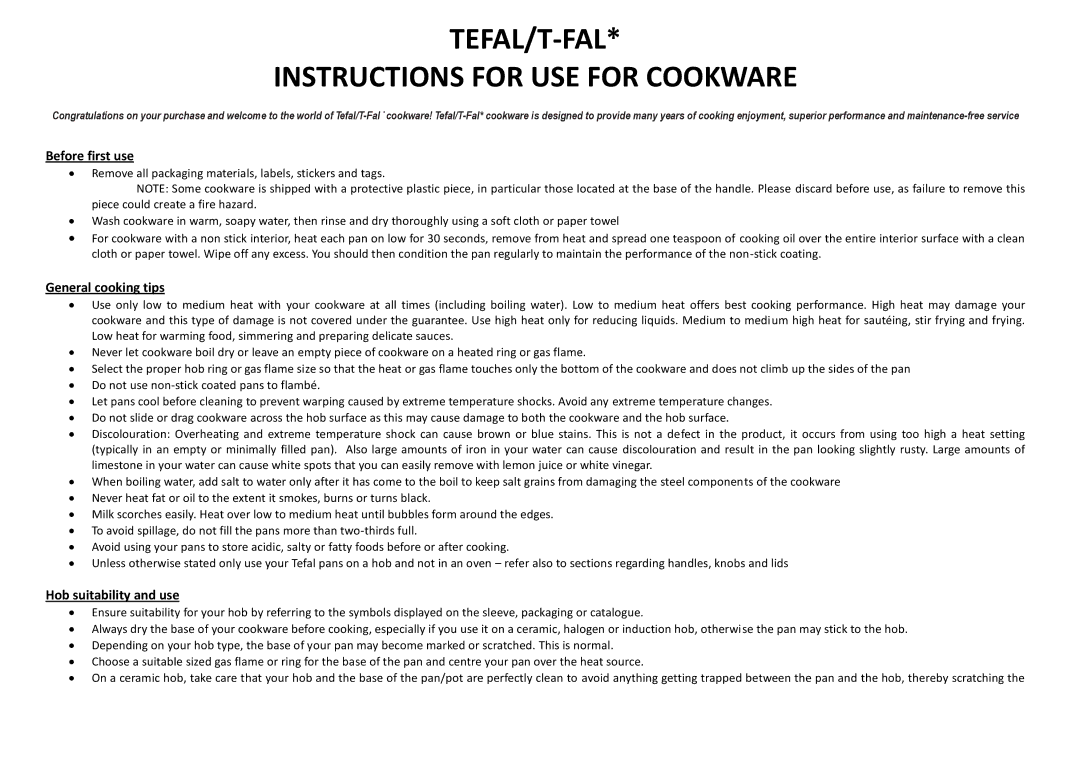MINERAL Signature, Jamie Oliver TEFAL Hard Anodized, Ingenio XL, Flavour, Home Chef specifications
Tefal is renowned for its innovative cookware and kitchen appliances, and its range, including Classychef, Ingenio Gourmet, Ingenio Easy, Intuition, and Ingenio Talent, demonstrates a commitment to quality, versatility, and user-friendly design.The Tefal Classychef features a durable stainless steel construction that provides excellent heat conductivity and performance. Its elegant design is complemented by a polished finish, making it a stylish addition to any kitchen. Classychef pans are equipped with Tefal's unique Thermo-Spot technology, which indicates when the pan has reached the optimal cooking temperature. This ensures that food is cooked evenly and prevents overcooking.
Ingenio Gourmet is designed for versatility with its unique stackable system. The detachable handle allows users to seamlessly transition from stovetop to oven and even to the table. This innovative feature saves space and makes storage easy. Ingenio Gourmet's titanium reinforced non-stick coating ensures that foods slide off effortlessly while remaining scratch-resistant, making it durable and easy to clean.
Ingenio Easy incorporates the same stackable design approach, emphasizing convenience. Its lightweight construction makes it easy to handle, while the removable handle is designed for safety—ensuring it securely locks in place during use. This range also features a high-quality non-stick coating, designed for healthier cooking with minimal oil, enhancing the overall user experience.
Intuition cookware stands out for its exceptional heat distribution and cooking performance. Manufactured from high-quality aluminum, Intuition pans utilize Tefal's unique Thermo-Spot technology for precise cooking control. They come with a reinforced non-stick interior that promotes easy food release and hassle-free cleaning. The ergonomic handles are designed for comfort and safety, allowing for a secure grip.
Ingenio Talent offers a premium cooking experience with its advanced non-stick surface, engineered for both durability and performance. This range features a robust design, with heat-resistant handles that can withstand oven temperatures, making it ideal for a variety of cooking methods. Ingenio Talent also embraces the stackable system for easy storage, catering to modern kitchen needs.
In summary, the Tefal Classychef, Ingenio Gourmet, Ingenio Easy, Intuition, and Ingenio Talent ranges provide users with a wealth of features, from advanced non-stick coatings to innovative stackable designs. Each line is built to enhance the cooking experience, offering durability, versatility, and ease of use that meet the demands of contemporary kitchens. With Tefal, cooking becomes an enjoyable and efficient process, elevating everyday meals and culinary adventures alike.
